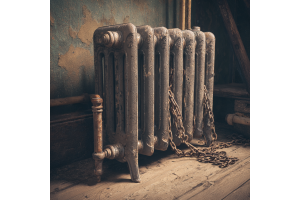
Your definitive guide to keeping your home warm, safe and efficient
When it comes to your home’s comfort, energy bills and safety, the heating system plays a vital role. As we enter colder months, one question often asked is: how often should you service your heating system? Whether you’re a homeowner, landlord or simply preparing for winter, understanding the right frequency and what servicing entails is key.
In this guide we’ll cover:
-
Why servicing matters
-
How often you should service (and why)
-
What factors alter the frequency
-
What a service involves
-
The best time of year to schedule it
-
Consequences of neglecting servicing
-
Practical checklist for homeowners
1. Why Servicing Your Heating System Matters
Servicing your heating system (including boiler, controls, pipework and radiators) offers several important benefits:
Safety
One of the most significant reasons is safety. For gas and oil - fired systems, improper combustion, leaks (including carbon monoxide) and flue problems can pose serious risks. According to the guidance of British Gas, a service is the best way to ensure your boiler is working safely.
Left unchecked, small faults can become dangerous.
Efficiency & Running Costs
A well-maintained system runs more efficiently, uses less fuel and thus keeps your energy bills lower. As one guide points out:
“Regular servicing helps maintain efficiency, prevent unexpected failures, and ensures safety.”
If your boiler or system is dirty or parts are worn, efficiency drops and costs rise.
Maintain Warranty & Manufacturer Requirements
Most modern boilers and heating systems come with warranties — but they frequently require evidence of annual servicing to remain valid.
Failing to service could void your warranty and leave you with costly repairs.
Longevity & Avoiding Breakdowns
Regular servicing helps identify minor issues before they become major breakdowns. As Worcester Bosch say: “Booking a boiler service once every 12 months will help keep it safe, sound and efficient.”
A breakdown in the winter can be expensive and inconvenient — hence preventive maintenance pays off.
2. How Often Should You Service Your Heating System?
The standard recommendation: once a year
In the UK residential context the common guidance is that you should service your boiler or heating system at least annually. For example:
-
“An oil or gas boiler should be serviced within twelve months of the previous servicing.” Heatable
-
“Your boiler must be serviced by a Gas Safe or OFTEC engineer once a year at minimum.”
-
“Most experts and manufacturers recommend servicing your boiler once a year.”
Why “at least” and not less often?
Because skipping or delaying tends to allow build-up of issues (e.g., corrosion, deposits, leaks) which lead to loss of efficiency or safety hazards. Even if your system seems fine, internal wear happens.
Additional considerations – when you may need more than once a year
While once a year is a baseline, there are scenarios where more frequent checks make sense:
-
If you have a commercial or high-use boiler/system (in a large property or multi-occupancy). The commercial guidance notes servicing every 12 months, and possibly every 6 months in heavy-use settings.
-
If your heating system is older, uses less common fuel, or has known issues.
-
If you’ve recently installed a new system and want to monitor its performance.
-
If you live in a hard water area or there’s a lot of sludge/limescale build-up — this may require more attention (flushing, inhibitor-treatment) beyond the standard annual service.
Summary of frequency guidance
| Situation | Recommended service frequency |
|---|---|
| Typical UK home gas or oil boiler | Once every 12 months |
| New installation (first year) | Service after ~12 months from install then annually |
| Landlord/let property | At least annually (legal requirement for gas appliances) |
| Large/heavy‐use/commercial system | Annually, possibly more often (6-months) |
3. The Best Time of Year to Service
Timing your service can make a difference in availability, price, and readiness for the heating season.
Why summer or early autumn is ideal
Many experts recommend booking your annual service during the warmer months – e.g., late spring, summer, early autumn. Reasons:
-
Engineers are less busy, so you may get better availability.
-
You’ll get ahead of the winter rush – any issues found can be fixed well before the cold sets in.
-
The system is likely under less strain, making checking and cleaning easier.
Avoid waiting until the coldest months
Booking in November or December risks your engineer being busy, potential delays, and the system breaking down just as you need it most. For peace of mind, aim for servicing before peak usage.
4. What Does Servicing Actually Involve?
When you call the engineer, you should know what a boiler/heating‐system service typically includes so you can check what has been done.
Key elements of a service
Typical checks and tasks a qualified engineer will perform:
-
Visual inspection of boiler, pipework, flue, controls for signs of corrosion, leaks, wear and tear.
-
Checking combustion, gas pressure (for gas boilers), and correct fuel flow.
-
Flue and ventilation check — ensuring no blockages, safe venting.
-
Cleaning of key components — burner, heat-exchanger, filters, seals if needed.
-
Safety checks — gas leaks, carbon monoxide risk, electrical connections.
-
Check that the heating system controls, thermostats, timers are working properly and efficiently.
-
Checking that your heating system is running efficiently (i.e., optimal fuel/energy usage).
-
Documentation: The engineer should provide a signed service log or certificate which you keep for warranty or insurance.
What a service does not always include
-
A full system flush (removing sludge, rust and scale) — this may be an extra service.
-
Radiator power‐flush or major repairs — these may incur costs beyond the basic service.
-
Extensive replacements of major components (unless faults found) — the service is primarily inspection and maintenance.
Who should carry it out?
-
For gas boilers: A member of the Gas Safe Register.
-
For oil boilers: An engineer registered with the Oil Firing Technical Association (OFTEC) or equivalent.
-
Ensure the engineer is qualified, insured, and you keep the paperwork for your records.
5. Factors That Can Alter the Frequency
While once annually is a good rule of thumb, let’s look at factors that might mean you service more (or less) often.
Usage & system size
If you have a large property, many radiators, high heating demand (e.g., older building, poor insulation) or use the system heavily (e.g., large family), then more frequent attention may be justified.
Age of system
Older boilers and heating systems may degrade faster. Corrosion, wear, sludge build-up may be more advanced. As a result more frequent health‐checks might help prolong life and avoid emergency replacements.
Fuel type
Gas and oil systems tend to require more regular servicing given the risks of combustion and flue. Electric boilers/heat pumps may require less frequent servicing (though checks are still good). As one guide notes: “Electric boilers won’t need the same amount of service as their oil and gas counterparts.”
Warranty requirements
As mentioned earlier, warranty terms often mandate annual servicing. If you skip this you may lose cover; so check your manufacturer’s terms.
Environmental/installation factors
If you live in an area with hard water (leading to limescale), or your system is in a location prone to dirt/dust/humidity, then servicing may need to be more frequent. Also, if the flue or condensate pipe is exposed to the elements, extra checks are prudent.
System components & radiators
If you have a heating system with multiple zones, underfloor heating, or a complex setup, then servicing may cover more components and might justify more regular check-ups.
6. Consequences of Neglecting Servicing
What happens if you skip servicing or delay it?
Safety hazards
Failing to service can lead to dangerous issues such as carbon monoxide leaks, flue blockages or gas leaks. As noted: “In the past decade (2010 – 2022) … the toxic effects of carbon monoxide poisoning caused between 116 and 197 deaths yearly.”
Increased running costs
An inefficient boiler or system may waste fuel, cost you more in bills, and put more strain on components.
Higher risk of breakdowns & expensive repairs
Small faults when left alone can become major repairs — which cost more and often occur at inconvenient times (e.g., deep winter).
Voided warranty
If you don’t meet the annual servicing requirement many manufacturers may refuse a warranty claim, meaning you bear the full cost of repair or replacement.
Reduced lifespan
A poorly maintained system will age faster and may need replacing sooner than one which is regularly maintained.
Inconvenience
A breakdown in the middle of winter can leave you without heating and hot water, while engineers are busy and spare parts are harder to get quickly.
7. Your Practical Checklist for Homeowners
Here is a step-by-step checklist to use or provide on your site for homeowners.
Before your annual service
-
Find out when your last service was and schedule the next one (aim for within 12 months).
-
Check your boiler’s logbook or warranty documentation to ensure you meet any servicing requirements.
-
Choose a qualified engineer (Gas Safe / OFTEC) and ask for proof.
-
Make sure you’re home for the appointment and know the approximate time (services typically take 30-60 minutes).
During or immediately after the service
-
Ask for the service report/documentation.
-
Ask what was checked and if any issues or recommendations were noted (e.g., heating system flushing, parts needing replacement).
-
Make a note in your diary/calendar of the next service due date.
-
If the engineer suggests additional work (e.g., power flush, inhibitor treatment, sediment removal) ask for a quote and timeframe.
Between services (regular checks)
-
Check for unusual cold spots on radiators or if some radiators take much longer to heat up.
-
Monitor boiler room for any leaks, unusual noises or smells.
-
Check boiler pressure (many combi boilers operate at around 1-1.5 bar when cold).
-
Install and test a carbon monoxide alarm if you have a gas or oil burning appliance.
-
If radiators show signs of sludge (cold at bottom, gurgling noise), ask your engineer about a power flush.
8. Why Use Geyser for Your Heating System Service?
At Geyser we specialise in keeping your heating system safe, efficient and ready for the weather ahead. Here are some of the benefits of choosing us:
-
Expertise in a wide range of heating systems including gas, oil and newer heat-pump systems.
-
Qualified and registered engineers (Gas Safe, OFTEC) – the correct people for the job.
-
A service schedule reminder so you never forget your next check-up.
-
Comprehensive report after each visit, giving you full peace of mind.
-
Excellent customer service, prompt appointments (especially in the off‐peak season).
-
Transparent pricing and no hidden costs.
If you haven’t yet booked your annual service, now is the time to act – get ahead of the winter rush and ensure your heating system performs when you need it most.
9. Frequently Asked Questions (FAQ)
Q: Is annual servicing legally required?
A: For homeowners in the UK, there is no legal requirement that you must have your boiler serviced every year. However, for landlords and let properties the law (Gas Safety (Installation & Use) Regulations) requires that gas appliances are safely maintained and inspected annually.
Moreover, manufacturers and insurers will often treat annual servicing as a requirement for warranty or cover.
Q: My system is new and working perfectly — do I still need to service annually?
A: Yes — even new systems benefit from an annual check. It ensures installation was correct, there are no early faults, and you keep the warranty valid. Guides recommend the first service about 12 months after installation.
Q: What if I only use the heating seasonally (e.g., a holiday home)?
A: You should still aim for an annual service (or at least every 12 months since the last service) because wear, corrosion and sediment can accumulate even when usage is low.
Q: What’s the cost of a boiler/heating system service?
A: Costs vary by region, system type and provider. Some guides suggest around £100-£200 for a standard UK service. Consider it an investment that avoids bigger costs later.
Q: How do I know if my system might need a more extensive service (e.g., flushing)?
A: Signs include: radiators with cold spots (especially at bottom), gurgling/rumbling pipes or boiler, unusual noises, higher bills, older system. In those cases ask your engineer about power-flush or inhibitor treatment.
10. Conclusion
Servicing your heating system should be viewed not as an optional luxury, but as a key part of ensuring safety, efficiency, and long-term performance. For most UK households the recommended interval is once every 12 months, ideally during the warmer months, by a qualified engineer.
By taking action ahead of winter, you reduce risk of breakdowns, protect your warranty, keep your energy bills lower and sleep easier knowing your system is in strong shape.
If you haven’t scheduled your next service yet — book now. Your home, your comfort, and your wallet will thank you.
If you’d like Geyser to check your system, get in touch with us today and we’ll help you book your service at a convenient time.







